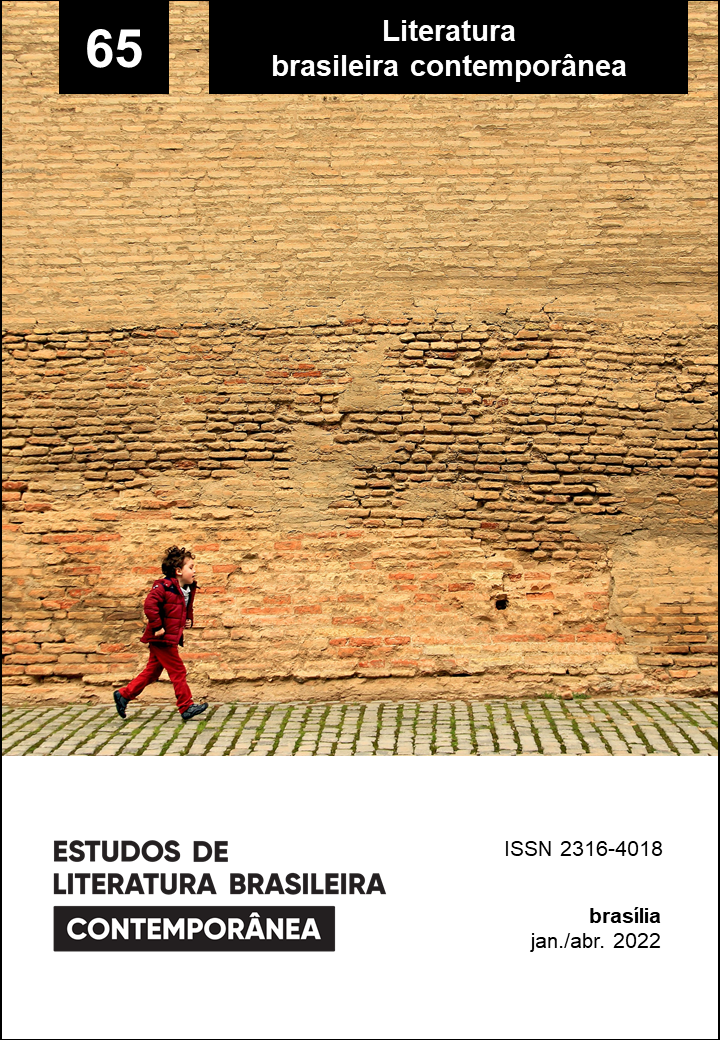Subaltern rhetoric in Graciela Huinao and Conceição Evaristo through the voice metaphor
DOI:
https://doi.org/10.1590.2316-40186501Keywords:
Subaltern rhetoric, orality, Graciela Huinao, Conceição EvaristoAbstract
In the current analysis, we intend to address Graciela Huinao’s collection of poems Walinto and Conceição Evaristo’s Poemas da recordação e outros movimentos from the subaltern rhetoric perspective. Understanding this as evidence of metaphors that subvert colonizing discourse. In accordance with it, we have linked the works of Huinao and Evaristo through the metaphor of the voice. Which we say configures the common space of openness towards the other, as an echo, resonance and/or scream, textualizing the connotative privilege of oral cultures and the contemporary conceptions of the multiple and plural subjectivities.
Downloads
References
ASSIS, Eduardo Duarte de (2006). O Bildungsroman afro-brasileiro de Conceição Evaristo. Estudos Feministas, Florianópolis, v. 14, n. 1, p. 305-308. Disponível em: https://www.scielo.br/j/ref/a/g7gPJT4f9yzqMyFyLxR6HBb/. Acesso em: 10 out. 2021.
CARDOSO, Carlos Guerra (2015). La poética adivinatoria de Ifa: transculturación yórùbà en la escritura caribeña. 698f. Tese (Doutorado em Literatura y Teoría de la Literatura) – Universidad de las Palmas de la Gran Canaria, Las Palmas de Gran Canaria. Disponível em: https://accedacris.ulpgc.es/bitstream/10553/18397/4/0727165_00000_0000.pdf Acesso em: 10 out. 2021.
CARRASCO MUÑOZ, Ivan (2000). Poesía mapuche etnocultural. Anales de Literatura Chilena, n. 1, p. 195-214.
CARRASCO MUNÕZ, Ivan (2010). Cherruve…¿ Primera novela mapuche?... Lengua y Literatura Mapuche, n. 14, p. 27-36. Disponível em: https://revistas.ufro.cl/ojs/index.php/indoamericana/article/view/694. Acesso em: 10 out. 2010.
DERRIDA, Jacques (1968). La diferencia/[differánce]. Santiago: Escuela de Filosofía Universidad ARCIS. E-book. Disponível em: https://www.philosophia.cl/biblioteca/Derrida/La%20Diferencia.pdf. Acesso em: 10 out. 2021.
EVARISTO, Conceição (2008). Poemas da recordação e outros movimentos. Rio de Janeiro: Malê.
FALLABELA LUCO, Soledad (2006). Hilando en la memoria: la poesía de poetas mapuche contemporáneas: Millapan, Curriao, Huinao y Panchillo. Hispamérica, ano 35, n. 105, p. 69-82. Disponível em: https://www.jstor.org/stable/20540743?refreqid=excelsior%3A4e12951329b2fe5b9f0ba0fc088e065e. Acesso em: 10 out. 2021.
FELDMAN, Alba Krishna Topan; SILVESTRE, Nelci Alves Coelho (2015). “Vozes-mulheres” do terceiro mundo: a perspectiva de Conceiçao Evaristo. Anuário de Literatura, Florianópolis, v. 20, n. 1, p. 96-111. Disponível em: https://periodicos.ufsc.br/index.php/literatura/article/view/2175-7917.2015v20n1p96. Acesso em: 12 out. 2021.
GENETTE, G. (1970). Lenguaje poético, poética del lenguaje. Buenos Aires: Nueva visión.
HUINAO, Graciela (2009). Walinto. Santiago: Cuarto Propio.
MIRANDA, Fernanda Rodrigues de (2019). Ponciá Vicêncio: Narrativa e contramemória colonial. Anuário de Literatura, Florianópolis, v. 24, n. 2, p. 15-29. Disponível em: https://periodicos.ufsc.br/index.php/literatura/article/view/2175-7917.2019v24n2p15/41875. Acesso em: 10 out. 2021.
MONTEIRO, Liliane Nogueira (2016). A representação da mulher negra na literatura brasileira. In: SIMPÓSIO LINGUAGENS E IDENTIDADES DA/NA AMAZÔNIA SUL-OCIDENTAL, 10., COLÓQUIO INTERNACIONAL AS AMAZÔNIAS, AS ÁFRICAS E AS ÁFRICAS NA PAN-AMAZÔNIA, 8., Rio Branco. Anais […] Rio Branco: UFAC. Disponível em: https://docplayer.com.br/29462632-A-representacao-da-mulher-negra-na-literatura-brasileira-liliane-nogueira-monteiro-1.html. Acesso em: 10 out. 2021.
MORA CURRIAO, Maribel (2018). Muestra de poesía mapuche. Trazas poéticas sobre una cartografía indígena incesante. Anales de la Universidad de Chile, n. 13 p. 165-218. Disponível em: https://anales.uchile.cl/index.php/ANUC/article/view/49003. Acesso em: 10 out. 2021.
MORA, Ziley (2001). Filosofía mapuche: palabras arcaicas para despertar el ser. Concepción: Kushe. Disponível em: https://www.folkloretradiciones.com.ar/literatura/Mora%20Penros%20Ziley%20-%20Filosofia%20Mapuche.pdf. Acesso em: 10 out. 2021.
MORAGA, Fernanda (2009). A propósito de la “diferencia”: poesía de mujeres mapuche. Revista Chilena de Literatura, n. 74, p. 225-239.
MOSCIATTI, Ezio. Graciela Huinao: si un verso mío fortalece la identidad de los niños mapuches, soy feliz. biobiochile.cl. 10 out. 2012. Disponível em: https://www.biobiochile.cl/noticias/2012/10/10/graciela-huinao-si-un-verso-mio-fortalece-la-identidad-de-los-ninos-mapuche-soy-feliz.shtml. Acesso em: 10 out. 2021.
RAMA, Ángel (1998). La ciudad letrada. Montevideo: Arca.
RICOEUR, Paul (1995). Teoría de la interpretación: discurso y excedente de sentido. México D. F.: Siglo XXI.
SANTOS, Daiana Nascimento dos (2011). Imaginarios y representaciones en la tradición oral africana y latinoamericana. Acta literaria, n. 42, p. 145-150. Disponível em: https://www.scielo.cl/scielo.php?script=sci_arttext&pid=S0717-68482011000100010. Acesso em: 10 out. 2021.
SOUZA, Rosana Arruda de (2019). Memória rastro em poemas de Conceição Evaristo. Anuário de Literatura, Florianópolis, v. 24, n. 1, p. 13-22. Disponível em: https://periodicos.ufsc.br/index.php/literatura/article/view/2175-7917.2019v24n1p13. Acesso em: 10 out. 2021.
THOMAZ, Paulo C. (2015) Des-reterritorialização: percursos possíveis do romance afro-brasileiro recente. Estudos de literatura brasileira contemporânea, n. 15, p. 21-35, jan./jun. Disponível em: https://www.scielo.br/j/elbc/a/vsK5wPrfL9X76hhtsNw7spH/?format=pdf. Acesso em: 10 out. 2021.
Downloads
Published
How to Cite
Issue
Section
License
Copyright (c) 2022 Paola Lizana Miranda

This work is licensed under a Creative Commons Attribution-NoDerivatives 4.0 International License.
Authors who publish in this journal agree to the following terms:
a) The authors maintain the copyright and grant the journal the right of first publication, the work being simultaneously licensed under the Creative Commons Attribution License-Non Commercial 4.0 which allows the sharing of the work with acknowledgment of the authorship of the work and publication this journal.
b) Authors are authorized to enter into additional contracts separately, for non-exclusive distribution of the version of the work published in this journal (eg publish in institutional repository or as a book chapter), with authorship recognition and publication in this journal.
c) Authors are allowed and encouraged to publish and distribute their work online (eg in institutional repositories or on their personal page) after the editorial process, as this can generate productive changes, as well as increase the impact and citation of published work (See The Effect of Free Access).
d) The authors of the approved works authorize the magazine to, after publication, transfer its content for reproduction in content crawlers, virtual libraries and the like.
e) The authors assume that the texts submitted to the publication are of their original creation, being fully responsible for their content in the event of possible opposition by third parties.


